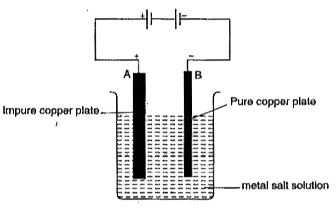Which one is not a process of purification of metals:
chromatrography
zone refining
froth floatation
distillation
The correct Answer is:C
To determine which one is not a process of purification of metals among the options given (Chromatography, Zone refining, Froth flotation, and Distillation), we can analyze each process step by step.
1. Chromatography:
- Chromatography is a method used for separating components of a mixture based on their different affinities towards a stationary phase and a mobile phase.
- In the context of metal purification, it can be used to separate and purify metals based on their density and solubility.
- Conclusion: Chromatography is a process of purification of metals.
2. Zone Refining:
- Zone refining is a technique used to purify crystalline solids, particularly metals.
- In this method, a molten zone is moved along a solid bar of metal, allowing impurities to concentrate in the molten zone while the pure metal crystallizes behind it.
- Conclusion: Zone refining is a process of purification of metals.
3. Froth Flotation:
- Froth flotation is a process used primarily for the concentration of sulfide ores.
- In this method, the ore is mixed with water and chemicals to create a froth. The desired minerals attach to the bubbles and float, while impurities sink.
- However, this process does not purify the metal itself; it only separates the ore from the gangue material.
- Conclusion: Froth flotation is not a process of purification of metals; it is a concentration process.
4. Distillation:
- Distillation is a separation technique that involves heating a liquid to create vapor and then cooling the vapor to create a liquid.
- In the context of metal purification, it can be used to separate metals from impurities based on their different boiling points.
- Conclusion: Distillation is a process of purification of metals.
Final Answer:
The process that is not a method of purification of metals is Froth Flotation.
---
- Chromatography is a method used for separating components of a mixture based on their different affinities towards a stationary phase and a mobile phase.
- In the context of metal purification, it can be used to separate and purify metals based on their density and solubility.
- Conclusion: Chromatography is a process of purification of metals.
- Zone refining is a technique used to purify crystalline solids, particularly metals.
- In this method, a molten zone is moved along a solid bar of metal, allowing impurities to concentrate in the molten zone while the pure metal crystallizes behind it.
- Conclusion: Zone refining is a process of purification of metals.
- Froth flotation is a process used primarily for the concentration of sulfide ores.
- In this method, the ore is mixed with water and chemicals to create a froth. The desired minerals attach to the bubbles and float, while impurities sink.
- However, this process does not purify the metal itself; it only separates the ore from the gangue material.
- Conclusion: Froth flotation is not a process of purification of metals; it is a concentration process.
- Distillation is a separation technique that involves heating a liquid to create vapor and then cooling the vapor to create a liquid.
- In the context of metal purification, it can be used to separate metals from impurities based on their different boiling points.
- Conclusion: Distillation is a process of purification of metals.
The process that is not a method of purification of metals is Froth Flotation.
Topper's Solved these Questions
- GENERAL PRINCIPLES AND PROCESSES OF ISOLATION OF ELEMENTSBOOK - CBSE COMPLEMENTARY MATERIALCHAPTER - GENERAL PRINCIPLES AND PROCESSES OF ISOLATION OF ELEMENTSEXERCISE - Very Short Answer Type Questions
17 Videos
- GENERAL PRINCIPLES AND PROCESSES OF ISOLATION OF ELEMENTSBOOK - CBSE COMPLEMENTARY MATERIALCHAPTER - GENERAL PRINCIPLES AND PROCESSES OF ISOLATION OF ELEMENTSEXERCISE - Short Answer-I Type Questions
15 Videos
- ELECTROCHEMISTRY BOOK - CBSE COMPLEMENTARY MATERIALCHAPTER - ELECTROCHEMISTRY EXERCISE - LONG ANSWER TYPE QUESTIONS (5 Marks)
7 Videos
- HALOALKANES AND HALOARENESBOOK - CBSE COMPLEMENTARY MATERIALCHAPTER - HALOALKANES AND HALOARENESEXERCISE - CONCEPTUAL QUESTIONS
10 Videos
Similar Questions
Which of the following is not a method of purification of metals ?
View SolutionThe diagram shows the process of purification of copper metal. A thick copper plate A of impure copper and a thin copper plate B are immersed in a metal sulphate solution and an electric current is passed through it.

What is liberated at the cathode? Explain.
View Solution
Knowledge Check
Mond process is for the purification of
AMoBMnCNiDNone of these.Which is the process used for purification of bauxite are containing silicae as impurity ?
ABaeyer's processBHall's processCHoope's processDSerpeck's processIn the froth floatation process for the purification of minerals the particles float because
Athey are lightBthey are insolubleCtheir surface is preferentially wetter by oil.Dthey bear an electrostatic charge.
Metals like plantinum and palladium find application in the process of purification of hydrgoen.Justify.
View SolutionZone refining is used as a method of purification of metals which are
View SolutionIn the froth floatation process for the purification of minerals, the particles float because
View SolutionWhich one of these is not a process involved in the purification of water at a water treatment plant?
View SolutionWhich process is suitable for the purifucation of aniline ?
View Solution
